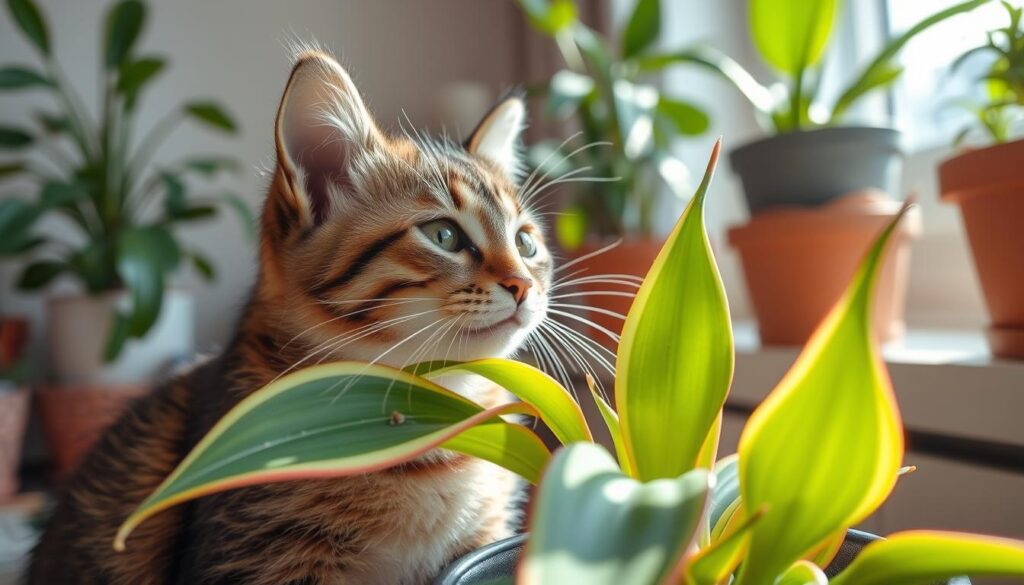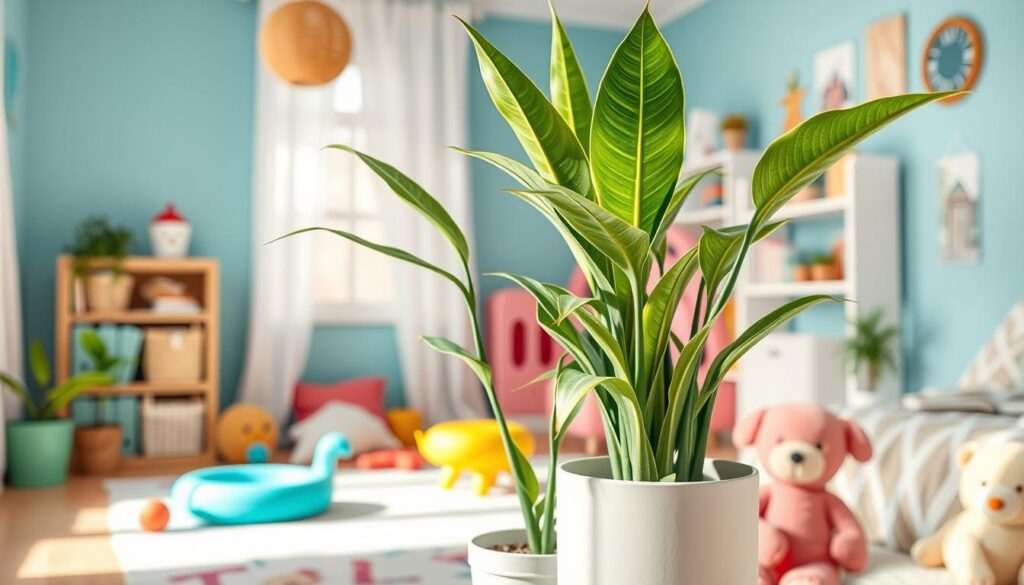I love plants, especially snake plants because they’re tough and easy to care for. They’re popular for making homes look good and for cleaning the air. But, some people worry that snake plants might cause allergies.
In this guide, we’ll look into how snake plants and allergies might connect. We’ll talk about what worries people and share important facts. This is for both plant lovers and those with allergies.
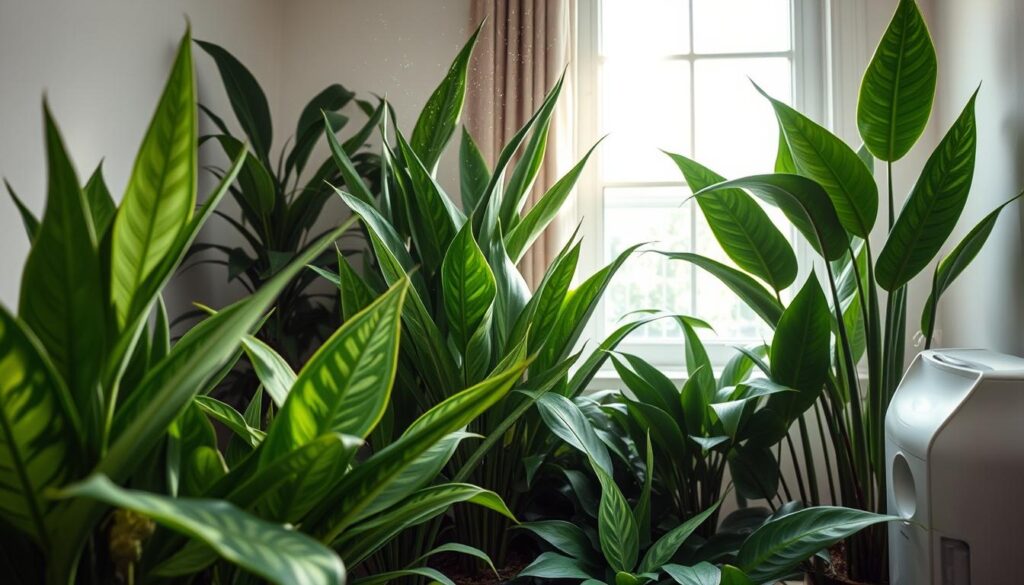
We’ll cover what allergens snake plants might have and clear up myths about allergies. This guide will help you feel sure about snake plants. It’s for anyone thinking of getting a snake plant or already has one and worries about allergies.
By the end, you’ll know how to safely bring snake plants into your home. This is important for keeping everyone’s health in mind, especially those with allergies.
Understanding Snake Plants and Their Potential Allergens
As people who care about allergies, knowing about snake plant allergens is key. These plants, also called Sansevieria or mother-in-law’s tongue, are popular for being easy to care for and good for the air. But, we need to look closer at what makes them allergenic to decide if they’re right for our homes.
Common Allergens Found in Snake Plants
Snake plants make pollen, which can make some people’s allergies worse. Their sap can also irritate skin, especially if you’re sensitive. Plus, dust on the leaves might have mold or other allergens, which is a worry for those with allergies.
Identifying Allergic Reactions to Snake Plants
Signs of an allergy to snake plants include sneezing, stuffy nose, itchy eyes, and skin problems. In serious cases, people might have trouble breathing. If you think you’re allergic, see a doctor to get help and find out what’s wrong.
Myth vs. Reality: Snake Plant Allergies
Many think snake plants are safe from allergies because they’re not as bad as some other plants. But, it’s a myth that they’re completely safe. Knowing what allergens snake plants have and watching how your body reacts is the best way to decide if they’re good for your home.
“Allergy-friendly” is a relative term when it comes to houseplants. It’s important to be aware of the potential allergens and to listen to your body’s reactions.
Snake Plants as Air-Purifying Indoor Plants
The NASA Clean Air Study highlights snake plants’ amazing air-purifying skills. These easy-to-care-for plants are great at removing indoor pollutants. They make indoor air cleaner and healthier.
Snake plants, also known as Sansevieria, are amazing at removing harmful substances. They take in formaldehyde, benzene, and trichloroethylene from things like furniture and paint. This makes them a top pick for better indoor air.
What makes snake plants stand out is how well they adapt. They need little care, making them perfect for those who are busy or new to plants. They also do well in different light and with less water, making them low-maintenance houseplants.
If you want to make your home air cleaner or just add some green, snake plants are a great choice. They help make your living and work spaces healthier. Plus, they’re easy to care for.
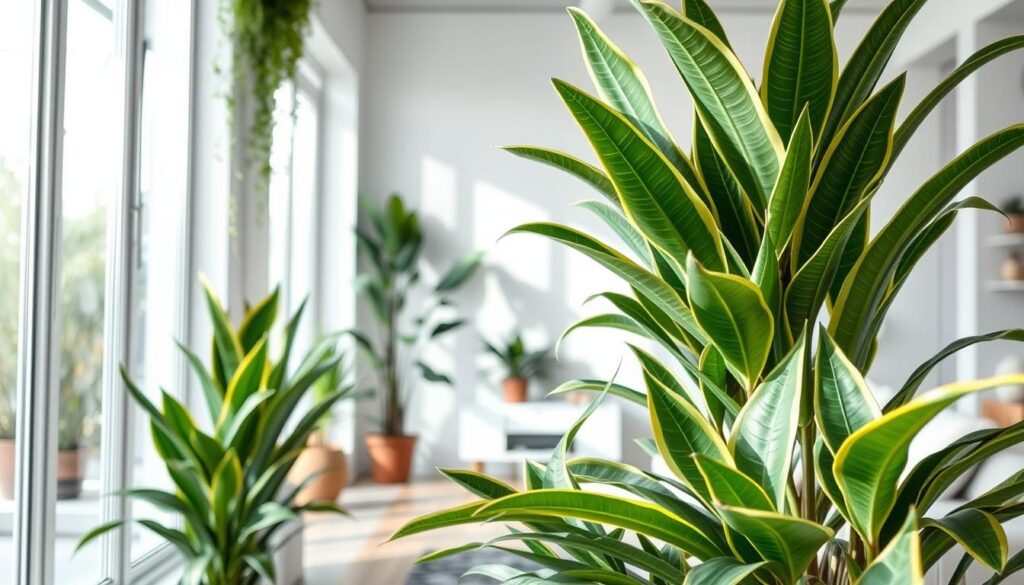
| Pollutant Removed | Percentage Reduction |
|---|---|
| Formaldehyde | 52% |
| Benzene | 107% |
| Trichloroethylene | 100% |
“Snake plants are one of the best air-purifying plants you can have in your home, thanks to their ability to remove harmful toxins and improve indoor air quality.”
Snake Plants Allergy Guide: Prevention and Management
Snake plants are popular for their ease of care. But, they might not be the best for those with allergies. You can still enjoy them by following some simple steps to reduce allergy risks.
Best Practices for Reducing Allergen Exposure
To cut down on allergens from snake plants, try these tips:
- Choose snake plant types with fewer allergens, like the Sansevieria trifasciata ‘Laurentii’.
- Wipe the leaves with a damp cloth to get rid of dust and pollen.
- Use gloves when touching the plant to avoid skin contact with allergens.
Proper Plant Placement and Ventilation
Where you put your snake plant matters for allergy control:
- Don’t place snake plants in busy areas or near where people sit.
- Make sure there’s good air flow around the plant to lower allergen levels.
- Using an air purifier near your snake plant can help clean the air.
Maintenance Tips for Allergy Sufferers
Keeping your snake plant in good shape can help with allergies:
- Trim off dead or dying leaves to stop dust and pollen buildup.
- Don’t overwater, as too much moisture can lead to mold and worsen allergies.
- Repot your snake plant every 2-3 years to keep the soil clean.
By following these tips, allergy sufferers can enjoy snake plants’ benefits. A little care can make your home a safe space from allergens.
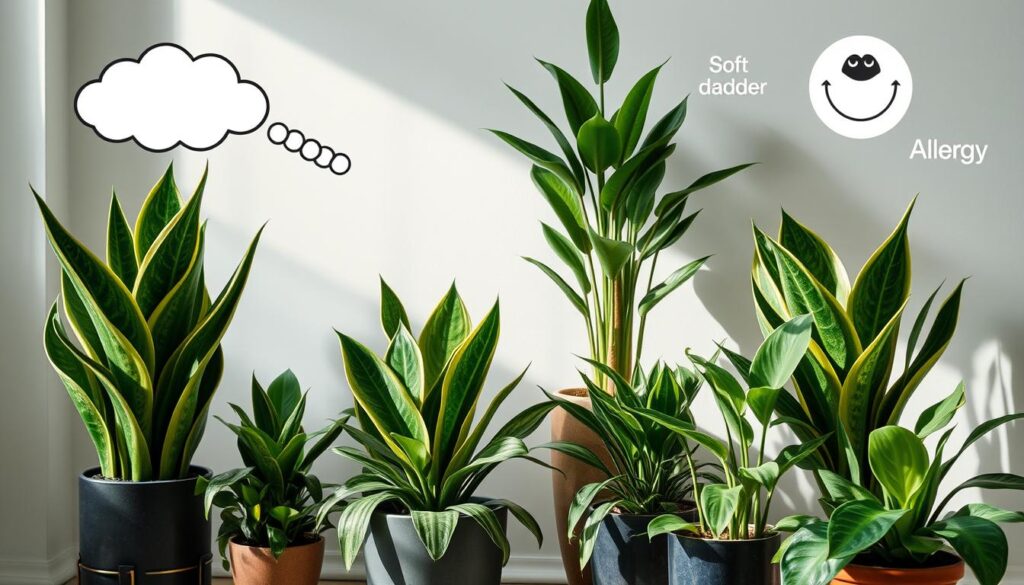
Safety Considerations for Pets and Children
As a responsible gardener, I know how important it is to keep pets and kids safe. When we add snake plants to our homes, we need to think about their safety. It’s key to be careful about their potential harm.
Snake plants, or Sansevieria, have compounds that can be dangerous if eaten. Even though the level of danger can vary, it’s wise to be cautious. We should keep these plants away from pets and kids. Also, it’s good to teach everyone in the family about the risks.
But, we can still enjoy the benefits of snake plants safely. We can place them where pets and kids can’t get to them. This means putting them on high shelves or in rooms that are closed off. Also, watching for any signs of chewing or tampering can help keep everyone safe.
FAQ
Are snake plants hypoallergenic?
Snake plants are often seen as low-allergen plants. But, they can still cause problems for some people. It’s key to know about the allergens in snake plants, like pollen and sap, and watch how you react.
Can snake plants cause allergic reactions?
Yes, snake plants can cause allergic reactions in some. The main culprits are pollen and sap. People with sensitivities might sneeze, have a runny nose, or get skin irritation from snake plants.
Are snake plants safe for pets and children?
Snake plants are mostly safe for humans but can be mildly toxic to pets. Keep them away from curious pets and young kids. This helps avoid accidents and keeps everyone safe.
How do I reduce allergen exposure from snake plants?
To cut down on allergens from snake plants, follow these steps: put the plant in a well-ventilated spot, clean the leaves often, and avoid touching it if you’re sensitive. Wearing gloves when you do need to handle the plant can also help.
Are snake plants air-purifying?
Yes, snake plants are great at purifying the air. The NASA Clean Air Study shows they remove indoor pollutants like formaldehyde and benzene. They’re a great choice for improving indoor air quality.
